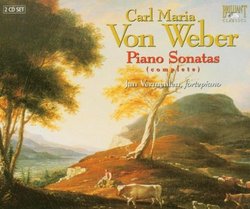| All Artists: Weber, Vermeulen Title: Piano Sonatas Members Wishing: 0 Total Copies: 0 Label: Brilliant Classics Release Date: 4/4/2006 Genre: Classical Styles: Chamber Music, Historical Periods, Classical (c.1770-1830) Number of Discs: 2 SwapaCD Credits: 2 UPCs: 5028421924410, 842977024418 |
Search - Weber, Vermeulen :: Piano Sonatas
CD Details |
CD ReviewsIT'S LATER THAN YOU THINK DAVID BRYSON | Glossop Derbyshire England | 08/11/2006 (5 out of 5 stars) "In his 40 short years Weber managed to produce four piano sonatas. I have lived a lot longer than that without getting to know them until now, and I don't recommend my own example. Two of the sonatas are in major keys, two in minor, but Weber's music in any mood is life-enhancing. He was a formidable piano virtuoso, as Hummel a little before him was, and his sonatas, like Hummel's, are probably still taxing even for today's players. The technique both demand is advanced without being virtuosic, and I detect surprisingly little - indeed no - influence from Beethoven in their treatment of the instrument. Probably nothing by Weber is a masterpiece of formal construction along Beethoven's lines, but these sonatas are not lightweight compositions like Weber's symphonies. They strike me as much more ambitious in tone than those, but they show Weber's heavenly melodic gift in much the way his operas do, they are full of his characteristic vivacity, and they are beautifully written for the instrument.
The instrument Jan Vermeulen uses here is described as a `fortepiano'. I would rather describe it as an early pianoforte. It is not like the feeble-toned thingies sometimes inflicted on us in performances of Mozart. A year and a half ago I heard a recital of piano works by Clara Schumann given by David Owen Norris on a piano built for her by her father and her uncle, and I was struck by the volume and sustaining-power that it was capable of. The instrument used in this set dates from 1825, considerably later than Beethoven's last piano concerto, it differs from a modern grand less in power than in tone, and Vermeulen is not afraid to show us what it can do. Vermeulen himself was mainly familiar to me from his interesting set of studies by Heller. Those are rather unassertive music, and I felt that his fine accounts were perhaps a little too restrained nevertheless. Weber needs a lot more fire and passion, and I'm happy to report that he doesn't stint us for those qualities this time. I am captivated not just by the music but by the performances. Vermeulen seems to me to understand Weber and to love the pieces. The beautiful melodies are beautifully played, the tone is strong but never forced, the tempi sound about right to me and there is a festive feel about the whole recital, even in the minor-key works. The first movement of the third sonata is marked `allegro feroce', and I confess that all I was capable of by way of a reaction before hearing the piece played was `Oh I say!' Weber had a sense of humour, witness his description of the start of Beethoven's fourth symphony `Every quarter of an hour one hears three or four notes.' The ferocity here in his sonata is similarly tongue-in-cheek, the direction is hyperbolic and ironic, and Vermeulen seems to get the hang of what it all means perfectly. I like his handling of the rhythm too, particularly his flexibility and sense for rubato in the very long first movement of the second sonata, in which as in the other first movements he observes the repeat. There is even a rather interesting liner-note, contributed by Florian Heyerick, otherwise known to me as a conductor, who is in fact credited as producer of this set. I may agree with is and not agree with that in what he says, but what I agree or disagree with is neither here nor there - the thing is thoughtful and thought-provoking. His English is a great deal better than my Dutch, and I would only question his text to the extent of suggesting that when he says `scientists' in his first sentence he probably means `scholars'. The recording is admirable in my own opinion. I have some idea from first hand (from the Owen Norris recital that I mentioned) of how an instrument like this ought to sound, and this is what it ought to sound like. I feel a sense of something like relief as well as the enormous pleasure that this set gives me. I might never even have heard these lovely sonatas. The rest will be silence sooner or later, and these are sounds I ought not to have missed." |

